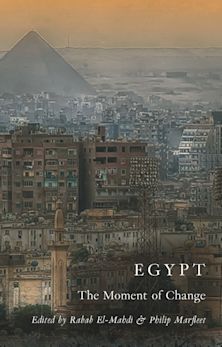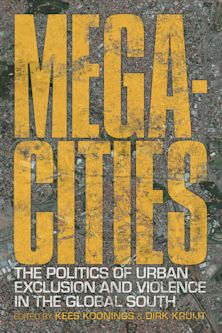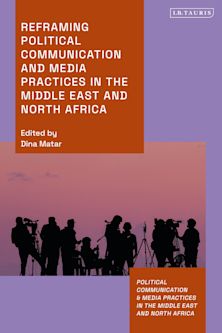- Home
- ACADEMIC
- Middle East
- North African Studies
- Marginality and Exclusion in Egypt
Marginality and Exclusion in Egypt
Ray Bush (Anthology Editor) , Habib Ayeb (Anthology Editor) , Kamal Fahmi (Contributor) , Moushira Elgeziri (Contributor) , Asef Bayat (Contributor) , Dalia Wahdan (Contributor) , Rabab El Mahdi (Contributor) , Heba Hagrass (Contributor) , Ali Kadri (Contributor) , Saker El Nour (Contributor) , Reem Saad (Contributor)
Marginality and Exclusion in Egypt
Ray Bush (Anthology Editor) , Habib Ayeb (Anthology Editor) , Kamal Fahmi (Contributor) , Moushira Elgeziri (Contributor) , Asef Bayat (Contributor) , Dalia Wahdan (Contributor) , Rabab El Mahdi (Contributor) , Heba Hagrass (Contributor) , Ali Kadri (Contributor) , Saker El Nour (Contributor) , Reem Saad (Contributor)
You must sign in to add this item to your wishlist. Please sign in or create an account
Description
What does it mean to be marginalized? Is it a passive condition that the disadvantaged simply have to endure? Or is it a manufactured label, reproduced and by its nature transitory?
In the wake of the new uprising in Egypt, this insightful collection explores issues of power, politics and inequality in Egypt and the Middle East. It argues that the notion of marginality tends to mask the true power relations that perpetuate poverty and exclusion. It is these dynamic processes of political and economic transformation that need explanation.
The book provides a revealing analysis of key areas of Egyptian political economy, such as labour, urbanization and the creation of slums, disability, refugees, street children, and agrarian livelihoods, reaching the impactful conclusion that marginalization does not mean total exclusion. What is marginalized can be called upon to play a dynamic part in the future -- as is the case with the revolution that toppled President Mubarak.
Table of Contents
1. Introduction: Marginality and exclusion in Egypt and the Middle East - Ray Bush and Habib Ayeb
2. Marginality: curse or cure? - Asef Bayat
3. Accumulation by encroachment in the Arab Mashreq - Ali Kadri
Part 2: Creating and reproducing marginality
4. Marginality or abjection? The political economy of poverty production in Egypt - Ray Bush
5. The marginalization of the small peasantry: Egypt and Tunisia - Habib Ayeb
6. Margins and frontiers - Reem Saad
7. Transport thugs: spatial marginalization in a Cairo suburb - Dalia Wahdan
8. Against marginalization: workers, youth and class in the 25 January revolution - Rabab el Mahdi
9. National geographical targeting of poverty in Upper Egypt - Saker el Nour
10. Working with street kids: unsettling accounts from the field - Kamal Fahmi
11. Marginalization and self-marginalization: commercial education and its graduates - Moushira Elgeziri
12. Disability in transition in Egypt: between marginalization and rights - Heba Hagrass
Product details
| Published | 14 Jun 2012 |
|---|---|
| Format | Ebook (PDF) |
| Edition | 1st |
| Extent | 258 |
| ISBN | 9781780320861 |
| Imprint | Zed Books |
| Publisher | Bloomsbury Publishing |
About the contributors
Reviews
-
This fascinating collection captures the rhythms of real life for the majority of Egyptians. Along with analytical heft, it features portraits of everyday abjection, struggle and adaptation that ring searingly true. Required reading for serious students of Egypt.
Chris Toensing, Middle East Research and Information Project
-
The contributors to this book effectively challenge the category of marginality as it is commonly used and show that "marginal" people and groups are actively created by the processes of neoliberal capitalism in which they have no role or value. At the same time, "marginals" do not acquiesce to their fate but find creative ways to exercise agency in dealing with their situations. Some contributors argue for the utility of a revised notion of marginality; others argue for increased attention to class and exploitation. This lively debate is a valuable contribution to understanding the underside of the neoliberal phase of capitalism in Egypt.
Joel beinin, Donald J. McLachlan Professor of History, Stanford University, California
-
I cannot imagine a more relevant collection of revealing snapshots of Egyptian society in the lead-up to the ousting of Mubarak. This excellent book not only offers an insightful reading of the conditions which led to the struggle of the Egyptian people against a devastating neoliberal economic system but also provides a solid contribution, which is grounded in class analysis and an experience of collective resistance, to our understanding of concepts of marginality and exclusion.
Maha Abdelrahman, University of Cambridge
-
This exciting book provides superb background to an understanding of the Egyptian "revolution" of 2011 and continuing. It provides fresh data on topics that are not generally covered in the press. The essays in this book are essential to understanding Egypt, both the expected and the unexpected.
Nicholas Hopkins, Professor Emeritus of Anthropology, The American University in Cairo

ONLINE RESOURCES
Bloomsbury Collections
This book is available on Bloomsbury Collections where your library has access.



































